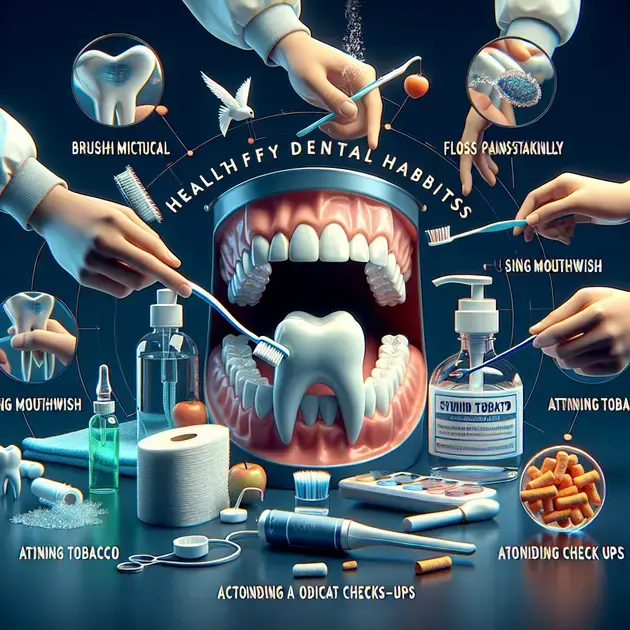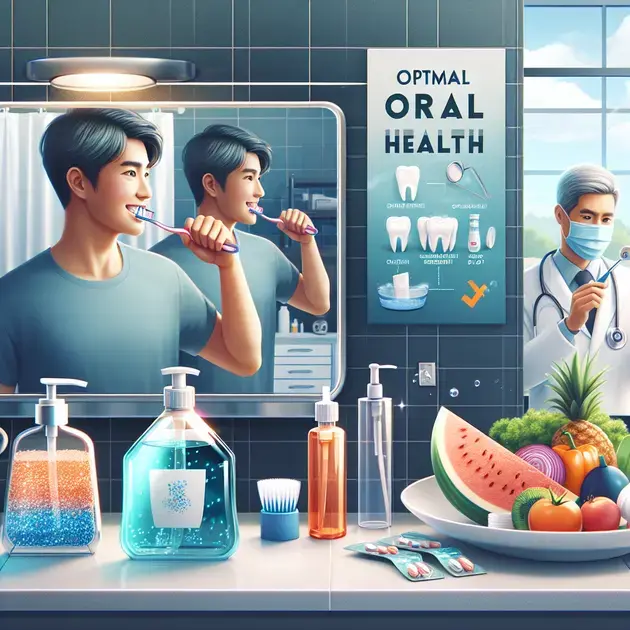Maintaining good oral health for teeth is crucial for overall well-being. A healthy mouth can help prevent various medical conditions and boost self-confidence. However, many people overlook the importance of proper dental care in their daily routine.
With the right habits and regular visits to the dentist, you can ensure that your teeth remain strong and healthy. In this post, we will explore some essential tips for maintaining good oral health and preventing common dental problems.

Tips for a Healthy Smile
Having a healthy smile is essential for overall well-being. Here are some tips to help you maintain a healthy smile:
1. Brush and Floss Regularly
One of the most important aspects of maintaining a healthy smile is brushing and flossing regularly. Brush your teeth at least twice a day and floss once a day to remove plaque and prevent cavities.
2. Use Mouthwash
In addition to brushing and flossing, using mouthwash can help kill bacteria and freshen your breath. Look for alcohol-free mouthwashes to avoid drying out your mouth.
3. Eat a Balanced Diet
Your diet plays a significant role in the health of your smile. Include plenty of fruits and vegetables, limit sugary and acidic foods, and drink plenty of water to keep your teeth and gums healthy.
4. Avoid Tobacco Products
Smoking and using other tobacco products can lead to stained teeth, gum disease, and oral cancer. Avoiding these products can help maintain a healthy smile.
5. Schedule Regular Dental Check-ups
Regular dental check-ups are crucial for maintaining a healthy smile. Visit your dentist at least twice a year for cleanings, examinations, and preventive care.
The Importance of Regular Dental Check-ups
Regular dental check-ups are essential for maintaining good oral health. Here’s why regular dental check-ups are important:
1. Early Detection of Dental Issues
Regular dental check-ups allow your dentist to detect any dental issues early on, such as cavities, gum disease, or oral cancer. Early detection can help prevent more significant problems in the future.
2. Professional Cleaning
During a dental check-up, your dentist will perform a professional cleaning to remove plaque and tartar buildup. This cleaning helps prevent tooth decay and gum disease.
3. Personalized Oral Care Advice
Your dentist can provide personalized advice on how to care for your teeth and gums based on your specific needs. This advice may include recommendations for oral hygiene products or techniques.
4. Monitoring Oral Health Changes
Regular dental check-ups allow your dentist to monitor any changes in your oral health over time. This monitoring can help catch potential issues before they become more severe.
5. Overall Health Benefits
Maintaining good oral health through regular dental check-ups has been linked to overall health benefits, such as reduced risk of heart disease and diabetes. Taking care of your smile can have a positive impact on your overall well-being.
Preventive Measures for Common Dental Issues
Prevention is key when it comes to dental health. Here are some preventive measures for common dental issues:
1. Maintain Good Oral Hygiene
Brushing and flossing regularly are essential for preventing common dental issues like cavities and gum disease. Make sure to use the proper techniques and tools for effective cleaning.
2. Wear a Mouthguard
If you participate in sports or grind your teeth at night, wearing a mouthguard can help protect your teeth from injury or wear. Custom-fitted mouthguards are available through your dentist.
3. Limit Sugary and Acidic Foods
Sugary and acidic foods can lead to tooth decay and erosion. Limit your intake of these foods and make sure to brush your teeth after consuming them to minimize their impact on your dental health.
4. Drink Water Throughout the Day
Water helps rinse away food particles and keep your mouth hydrated. Drinking water throughout the day can help prevent dry mouth and reduce the risk of cavities.
5. Visit Your Dentist Regularly
Regular dental visits are crucial for preventive care. Your dentist can provide professional cleanings, examinations, and advice on how to prevent common dental issues. Schedule check-ups at least twice a year.

**Healthy Habits for Strong Teeth**
Proper Brushing Techniques
One of the most important healthy habits for strong teeth is to ensure you are practicing proper brushing techniques. It is recommended to brush your teeth at least twice a day, using fluoride toothpaste and a soft-bristled toothbrush. Make sure to brush all surfaces of your teeth in a gentle circular motion to effectively remove plaque and food debris. Additionally, don’t forget to brush your tongue to remove bacteria and keep your breath fresh.
Choosing the Right Toothbrush
When it comes to maintaining strong teeth, choosing the right toothbrush is crucial. Opt for a toothbrush with soft bristles to prevent damaging your tooth enamel and gums. Replace your toothbrush every three to four months or sooner if the bristles become frayed. Investing in a high-quality electric toothbrush can also help improve your brushing technique and ensure a thorough clean.
Regular Dental Check-Ups
Regular dental check-ups are essential for maintaining strong teeth and preventing oral health issues. Visit your dentist at least twice a year for professional cleanings and examinations. Your dentist can identify any potential problems early on and provide necessary treatments to keep your teeth healthy. Don’t wait until you have a toothache to see the dentist – preventive care is key to a healthy smile.
Healthy Diet Choices
Another crucial healthy habit for strong teeth is maintaining a balanced diet. Limit sugary and acidic foods and beverages that can erode tooth enamel and contribute to decay. Instead, opt for foods rich in calcium, such as dairy products, leafy greens, and almonds, to promote strong teeth. Drinking plenty of water throughout the day can also help rinse away food particles and bacteria that lead to dental issues.
Use Mouthwash and Floss
In addition to brushing your teeth, incorporating mouthwash and flossing into your daily routine can further strengthen your teeth and gums. Mouthwash helps kill bacteria and freshen your breath, while flossing removes plaque and debris from between your teeth. Make sure to use these oral care products correctly to maximize their benefits and maintain optimal oral health.
Conclusion
In conclusion, adopting healthy habits for strong teeth is essential for optimal oral health. Proper brushing techniques, including brushing twice a day with fluoride toothpaste and a soft-bristled toothbrush, play a crucial role in removing plaque and maintaining clean teeth. Choosing the right toothbrush with soft bristles and replacing it regularly is important to prevent enamel and gum damage.
Regular dental check-ups are vital for early detection of any oral health issues and necessary treatments to keep your teeth healthy. Maintaining a balanced diet rich in calcium and avoiding sugary and acidic foods can promote strong teeth. Additionally, drinking water throughout the day helps rinse away bacteria and food particles that can lead to dental problems.
Lastly, incorporating mouthwash and flossing into your daily routine further strengthens your teeth and gums. Mouthwash helps kill bacteria and freshen breath, while flossing removes plaque from between your teeth. By following these healthy habits consistently and correctly, you can ensure optimal oral health, prevent dental issues, and maintain a bright, healthy smile for years to come.